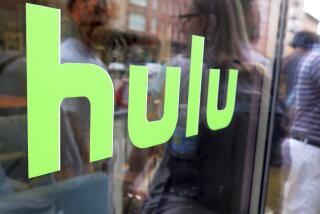Hulu’s tug of war with TV
- Share via
Online video site Hulu trumpeted its ascension to the media big time a few months back with a dash of sardonic humor. In its debut TV commercial, in which Alec Baldwin mocks the audience’s addiction to the very shows he creates as a fictional network executive, the site calls itself “an evil plot to destroy the world.”
The joke is uneasily close to the truth for some in the television business.
Once dismissed as “Clown Co.” by Silicon Valley critics who scoffed at the notion that old media giants could ever harness the Internet, the website with a name that sounds like a Hawaiian dance has quickly upset the status quo. Hulu’s traction with users has entrenched entertainment companies worried that the video site’s runaway success could undercut the financial underpinnings of the industry.
Those companies are fighting back, and the result could mean no more free passes for many signature cable programs that appear on Hulu.
NBC Universal and News Corp. publicly launched Hulu a little more than a year ago as a gamble on television’s digital future. The website allows viewers to watch thousands of episodes of TV shows for free, from current hits like “Family Guy” and “The Office” to old favorites like “WKRP in Cincinnati” and “I Dream of Jeannie.” Hulu’s simple design, expansive catalog and no cover charge have elevated it to one of the most popular websites for watching video.
With 42 million viewers in March -- an audience nearly twice the size of TV’s most popular show, Fox’s “American Idol” -- Hulu whizzed past Yahoo and Microsoft’s MSN, and is now nipping at the heels of Google’s YouTube.
“Hulu has certainly exceeded all of our expectations,” said Jean-Briac Perrette, NBC Universal’s president of digital distribution. “We’ve come a long way from Clown Co.”
Late last month, Walt Disney Co. overcame its initial skepticism and signed on as an equity owner of Hulu, which has nearly 150 content partners. That gives the video site even more star power with the addition of ABC’s “Desperate Housewives” and “Lost,” and cable hits such as ABC Family’s “The Secret Life of the American Teenager” and Disney Channel’s “Wizards of Waverly Place.”
“Our feeling is that -- and some of this is instinct, by the way -- media consumption online is growing and will continue to grow,” Disney Chief Executive Robert A. Iger said in a call last week with analysts who grilled him about Hulu. “It is really important for us to establish ourselves there.”
But in making a bid for the next generation of Internet- attuned viewers, Hulu’s owners have strained their lucrative relationships with cable and satellite operators. Companies like Time Warner Cable Inc. and DirecTV Group Inc. pay cable networks billions of dollars each year to carry programming. Believing that they should have exclusivity because their payments support the enormous cost of producing TV shows, such companies have been pushing back against the Hulu freebies.
Investors also are wary that the media companies’ embrace of the Internet-content-should-be-free philosophy threatens one of Hollywood’s biggest profit centers: cable programming.
“If you give away your premium content for free, you are basically hastening your own demise, signing your own death warrant,” said Laura Martin, a media analyst with Soleil-Media Metrics. “There is a choice that companies have to make.”
Hulu illustrates the quandary that media executives face as they weigh the potential of the Internet against their dependable, old-line businesses. If the television industry does not find a way to preserve its two pillars of revenue -- advertising and subscription fees -- the consequences could be dire. Analysts point to the rapid deterioration of newspapers, which traded paying print subscribers for the expectation of big bucks from online advertising that have not materialized.
The conflict has forced Hulu to make concessions that have hurt users who have come to expect a rich menu on the video site. In recent months, entire seasons of “It’s Always Sunny in Philadelphia” were abruptly taken off the site, along with episodes of other cable TV shows such as “In Plain Sight” and “Psych.”
Hulu even blocked access to a technology that lets its users watch content on their TVs. The move provoked outrage among fans of the software, called Boxee, drawing 385 angry comments on the company’s website.
“Big Media had better come out of their hole and embrace the power of Internet streaming or they’ll be in big trouble down the road,” wrote one poster who identified himself as Lew Ciokiewicz.
Hulu’s pullback in the case of “Always Sunny,” one of the site’s early favorites, underscores the tug of war within established media companies over the wisdom of placing TV shows on the Internet for free.
The quirky sitcom about a group of slackers has become a signature of the FX cable channel. (FX is a division of Fox, whose parent company, News Corp., is one of Hulu’s founding partners.)
Even as FX acknowledged Hulu brought it new viewers, the cable network nonetheless demanded that the video site drop three seasons from its free online offerings over fears it would undercut the show’s ratings and hamper lucrative DVD sales.
“We are not going to take steps that ignore the needs of our partners,” explained Hulu Chief Executive Jason Kilar.
In the summer of 2006, Hulu partners Fox and NBC were thinking primarily of their own needs. YouTube, the video site that Google Inc. would later buy for $1.65 billion, was beginning to look like the future of television. Initially designed as a platform to share homemade videos, it was quickly appropriated by users sharing TV highlights.
That terrified media executives, who feared they were about to lose control of their shows. They had cause for alarm: Consumers were gravitating toward online video at a faster clip than they had with cellphones, DVDs and even high-speed Internet service. With the lessons of music piracy and Napster freshly in mind, Hulu was launched in March 2008 as a way of keeping TV programming safely in the hands of its creators and distributors. And by making it free, it could short-circuit piracy.
It worked. Perhaps too well.
“The appetite for full-length TV shows online was larger than anyone thought or expected,” said Bobby Tulsiani, Forrester Research media analyst. “And now people are starting to wonder, do we even need the cable connections?”
The country’s largest cable operators aren’t waiting around to find out the answer. In recent months, the operators have taken a hard line against cable networks for funneling their shows to Hulu. Some have gone so far as to stipulate that cable networks limit the number of episodes they make available online. Others have imposed an outright ban. The strictures buy time for cable operators until they can develop their own response to Hulu.
That strategy puts cable networks in a corner. They don’t want to jeopardize the multimillion-dollar payments they receive from cable and satellite operators, so they are approaching the website cautiously. For example, Turner Broadcasting System Inc. refuses to give popular shows like TNT’s “The Closer” to Hulu, preferring to keep a handful of episodes on its own site.
“We have to be mindful of the fact that we have a good business that works for all the players,” said Andrew Heller, domestic distribution president for Turner Broadcasting. “We have to find ways to advance the business rather than cannibalize it.”
Even the cable channels owned by Fox and NBC have been stingy about what they provide on Hulu. Just five episodes of cable shows like “Psych” on NBC Universal’s USA Network or “Dog Whisperer” on Fox’s National Geographic channel appear on the site -- usually a week after their initial television run.
Fox and NBC say there is little evidence that people are canceling their cable subscriptions because of Hulu. They contend that making shows available online provides valuable publicity, which stokes viewership on TV.
Nonetheless, the two media companies are discussing ways to adapt Hulu to preserve their relationships with cable operators, whose carriage fees help underwrite the cable networks’ programming. Operators have another incentive to come to the table: They want to keep customers signed up for their high-speed Internet service, which people need to watch shows online.
NBC Universal and News Corp. are considering whether to adopt a cable industry initiative called authentication, which would require users to prove they are pay TV subscribers before they can watch current shows on Hulu.
The partners also are discussing setting up a tiered system for online video, with some shows available for free -- such as prime-time network offerings -- while others would be reserved for existing cable TV subscribers.
“Everyone is coalescing around a central area -- authentication,” said Tony Vinciquerra, chief of Fox’s television networks. “If we can move this in the right direction, it will be something relatively seamless to the consumer, and good for business overall.”
--
--
(BEGIN TEXT OF INFOBOX)
What’s Hulu?
An online service that allows viewers to watch television shows on their computers free of charge.
Owners: NBC Universal,
News Corp., Providence Equity Partners and soon, Walt Disney Co.
Launched: March 2008
Number of shows: 800
Number of advertisers: 200
Number of users: 42 million
in March
Distribution: On Hulu.com and 35 other websites, including AOL, IMDb, MSN, MySpace and Yahoo
Availability: Broadcast television shows can be watched a day after airing; cable TV shows usually appear a week later.
Source: Times research
More to Read
The biggest entertainment stories
Get our big stories about Hollywood, film, television, music, arts, culture and more right in your inbox as soon as they publish.
You may occasionally receive promotional content from the Los Angeles Times.











